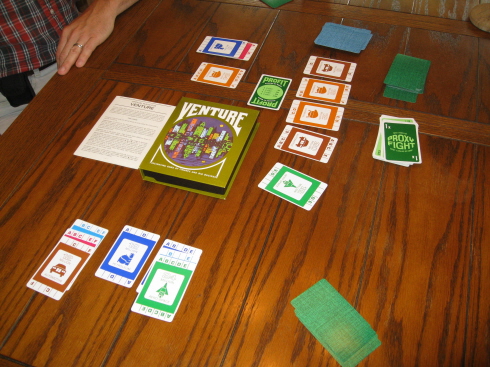

3M Bookshelf Games (later by Avalon Hill), 1968, 2-6 players, ages 13 and up. The goal in Venture is to make more money than the other players. This is acomplished by purchasing corporations and finding the best ways to combine them into "conglomerates". Income increases geometrically as more and more companies are added to a given conglomerate, although a conglomerate must have at least three corporations before it earns any money at all.
The game consists of two decks of cards - the corporation deck and the resource deck. The resource deck consists of money cards, proxy-fight cards and profit cards. The corporation deck consists of corporation cards (duh). At the start of the game, each player is dealt seven resource cards. Five cards are then turned face up from the corporation deck and represent the corporations available for purchase. During a given turn, players may turn in money cards in order to purchase corporations from the available five. Money cards come in various denominations ($1 million up to about $20 million). Additionally, money cards have various symbols on them (circle, square, triangle, etc) and turning in "sets" of cards (same symbol, different denomination) can make them worth considerably more than the sum of the individual denominations (a very interesting mechanic). Purchased corporations are replaced from the draw stack, and the game ends when the last corporation is purchased (with the player having earned the most money being declared the winner).
Players allot newly purchased corporations to their various conglomerates (or simply start a new one if there isn't a desireable fit). Each corporation card has one or more letters on it (A, B, C, D, E and F) and corporations within a conglomerate must all share at least one letter. IE, a corporation with letters "A and B" can't be merged with a corporation with letters "C and D". Conversely, a corporation with letters "A, D and F" could be merged with a corporation that has letters "A and B" (since they both have "A" in common). Conglomerate income is doubled (or more) if all corporations within a given conglomerate have more than one letter in common. Consequently, corporations with a lot of letters cost considerably more than corporations with one or two letters. And although a seemingly interesting mechanic, we found that building one-letter conglomerates was tough enough, and that spending a lot of time worrying about multi-letter conglomerates was basically a waste of time.
Corporations also have a generic industry label (steel, petroleum, etc) and a given conglomerate can only have one corporation from a given industry. Consequently, finding the right combination of letters and industries makes the task of forming large (and profitable) conglomerates a challenging task. There is no "bank" in the game, so there is no "change" when overpaying for a purchase. IE, if all you have is a $20 million money card and you want to purchase a $10 million corporation, you simply forfeit the extra $10 million.
In addition to purchasing corporations, players can use proxy-fight cards to steal corporations from other players. Only the most recently allocated corporation may be taken from a given conglomerate (IE, the top-most card of the stack). These cards can have devestating results since taking a single corporation from a conglomerate reduces its potential income by half. Proxy-fight cards cannot be challenged or otherwise evaded. However, they ain't free either. Depending on the card, the "thief" must pay to the bank either half the cost of the corporation in question, its full cost, or 1.5 times its cost.
Lastly, players may pay to reorganize their corporations into different conglomerates. The cost is $1 million per corporation controlled, so this becomes more and more expensive as the game goes along. Not coincidentally, reorganization also becomes more and more desireable as the game goes along. So, yeah, another cool mechanic.
At the end of each turn, players replenish their hands by drawing two new resource cards. If a "profit" card is drawn, players collect income from their conglomerates. This "we have no idea when a profit-taking event is going to occur" thing is probably the most annoyingly random aspect of the game. And unfortunately, it's often a huge game changer. Money earned during a profit step simply goes towards winning the game (IE, it isn't actually used for buying anything). If the resource deck is ever exhausted, the discard pile is simply reshuffled and play continues.
This game was designed by the same guy (Sid Sackson) who did 3M's "Acquire" game. And not surprisingly, it's simple, easy to learn, and chock full of game mechanisms that make for headache-inducing decision making as well as providing opportunities for clever strategy throughout. There are always about six things you'd like to do on a given turn, but inevitably you only have the resources to do about half of them - which always seems to make for a fun game. Like Acquire, Venture is breezy, quick and engaging. And although we've only played it a couple of times, it feels like a game that has some serious staying power (IE, a classic).